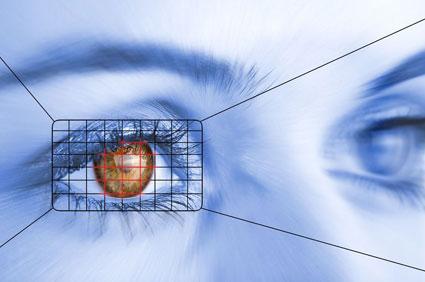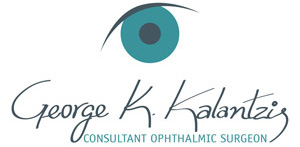Exophthalmos

Exophthalmos is a Greek word that means bulging or protruding eyeballs.
Proptosis is also a term that describes bulging eyeballs, although it is often used when only one eyeball protrudes.
Depending on what is causing exophthalmos, as well as bulging eyes, you may also have a number of other associated symptoms.
For example, if exophthalmos is caused by a thyroid-related condition, such as Graves' disease, as well as bulging, your eyes may also be:
-
inflamed, red and painful
-
dry and 'gritty'
-
tearful
-
sensitive to light (photophobia)
Your vision may also be affected - for example, you may have double vision or some loss of vision.
What causes expohthalmos?
Exophthalmos can be caused by many different conditions. It is important that the underlying cause is identified so that appropriate treatment can be given.
Conditions that affect the thyroid gland are a fairly common cause of exophthalmos. The thyroid is a small gland at the base of the throat that controls your metabolism (the rate at which your body uses energy).
A thyroid condition that affects the eyes is known as thyroid eye disease or thyroid orbitopathy.
An overactive thyroid gland can sometimes lead to a thyroid eye disease and symptoms such as puffy, swollen eyes, tearing and bulging eyeballs.
Exophthalmos is sometimes related to tumours (growths) that develop in the eyes. For example, a capillary haemangioma is a type of tumour that can develop in the eye cavity (orbit) during childhood. It can sometimes cause proptosis.
A pleomorphic lacrimal gland adenoma is a painless, slow growing eye tumour that can develop in adults in their 50s. In some cases, it can also cause proptosis.
Diagnosing exophthalmos
Exophthalmos is often easy to recognise from the appearance of the eyeballs, which clearly bulge or protrude from the sockets, exposing most of the whites of the eyes.
How much the eyeball bulges, the direction it protrudes and any other associated symptoms will often provide clues about the underlying cause. However, further tests will be needed to confirm a diagnosis.
Your GP may refer you to an ophthalmologist (a specialist in diagnosing and treating eye conditions). The ophthalmologist will check how well you are able to move your eyes. They may also use an instrument called an exophthalmometer to measure how far your eyeball protrudes.
If the ophthalmologist wants to examine your eye socket in more detail, a scan such as a computerised tomography (CT) scan or magnetic resonance imaging (MRI) scan may be used.
You may also have a blood test or a thyroid function test to check that your thyroid gland is working properly.
Treating exophthalmos
Treatment for exophthalmos will depend on the underlying cause.
If a thyroid problem is causing your eyes to bulge, treatment to stop your thyroid gland producing excess amounts of thyroid hormones may be recommended.
This can be achieved using medication, such as thionamides, or by having radioiodine treatment, where a chemical called radioactive iodine is swallowed which shrinks your thyroid gland.
The use of corticosteroids (medication that contains man-made versions of the hormone, cortisol) can help reduce painful eye inflammation.
If your eyes are dry, sore and inflamed, a lubricant, such as artificial tears, may also be prescribed to moisten your eyes and relieve irritation.
In cases where exophthalmos is caused by a tumour, treatments such as radiotherapy, chemotherapy or surgery may be appropriate. A combination of these treatments may sometimes be recommended.
Read more about treating exophthalmos.
Complications of exophthalmos
In very severe cases of exophthalmos, you may not be able to close your eyes properly. This can damage your cornea (the transparent tissue that covers the front of your eyeball) by causing it to dry out.
If your cornea becomes very dry, an infection or ulcers (open sores) may develop. If left untreated, these could damage your vision.
Other possible complications of exophthalmos include conjunctivitis (inflammation of the lining of the eye) and optic atrophy (deterioration of the optic nerve).
Outlook
As long as the underlying cause of exophthalmos is identified at an early stage, it can usually be successfully treated.
After treatment, any pain, redness, swelling or irritability will usually settle down after a few months, although in some cases it may take longer.
If exophthalmos is caused by thyroid eye disease, your eyes may not go back to normal. In up to 1 in 20 people, thyroid eye disease may get worse, resulting in double vision or some degree of visual impairment.
Treating exophthalmos
If you have exophthalmos (bulging eyes), your eyes will need to be regularly examined.
This is because sometimes exophthalmos can get worse and so your eyes need to be closely monitored.
The treatment your ophthalmologist (eye specialist) recommends will depend on what is causing your symptoms.
Thyroid problems
If your exophthalmos is caused by a thyroid problem, treatment to improve the functioning of your thyroid gland may be recommended. The aim of treatment will be to return your thyroid hormone levels to normal.
For example, an overactive thyroid can be treated with medication, such as thionamides, that prevents your thyroid gland producing excess amounts of thyroid hormones.
Radioiodine treatment is another type of treatment for an overactive thyroid. It involves swallowing a chemical called radioactive iodine, which builds up in your thyroid gland and shrinks it.
Thyroid eye disease can sometimes get worse after radioiodine treatment. If radioiodine treatment is planned and you have thyroid eye disease, a careful assessment by an expert ophthalmologist or endocrinologist (a specialist in hormone conditions) will be required before going ahead.
Read more about treating an overactive thyroid gland.
Treating your thyroid problems will not necessarily improve your eye-related symptoms. However, an untreated overactive or underactive thyroid gland may make your eyes worse.
In general, the more severe your exophthalmos is and the longer you have had it, the more likely it is to become permanent. Therefore, you should seek medical advice as soon as you notice you have bulging eyes so that the underlying cause can be identified and appropriate treatment can be started as soon as possible.
Self-help
Other things you can do to help treat eye-related symptoms of thyroid conditions include:
-
raising the head of your bed - for example, by using extra pillows to help reduce some of the puffiness around your eyes
-
stopping smoking (if you smoke) because it can significantly increase the risk of your thyroid condition affecting your eyes (see below)
-
wearing sunglasses if you have photophobia (sensitivity to light)
-
using eye drops to help relieve soreness and to moisten your eyes if you have dry eyes
-
wearing a patch over one eye if you have double vision
-
selenium supplements, which may help people with mild thyroid eye disease that has recently started (selenium is a mineral found in brazil nuts, meat and fish)
Smoking
The risk of developing thyroid eye disease is eight times higher in people who smoke than in people who do not smoke, or who have stopped smoking.
Non-smokers also tend to respond better to treatment for thyroid eye disease compared with people who smoke. However, this seems to reverse very quickly after a person gives up smoking.
Read more about giving up smoking.
Corticosteroids
Corticosteroids are sometimes recommended to treat severe cases of thyroid eye disease, where the eyes are particularly painful and inflamed.
Corticosteroids contain man-made versions of the hormone, cortisol, and are often used to reduce swelling and inflammation.
You may be prescribed a high dose of a corticosteroid called a glucocorticoid. This treatment is effective but can cause a number of side effects including:
-
weight gain
-
insomnia (difficulty sleeping)
-
osteoporosis (fragile bones)
You may be given corticosteroids intravenously (directly into a vein in your arm) because this method is thought to be safer and more effective than taking corticosteroid tablets.
Orbital radiotherapy
Radiotherapy is a treatment that uses high-energy radiation, usually X-rays, to destroy cells. Low doses of radiotherapy can be used on the eyes to help reduce the swelling. This is known as orbital radiotherapy.
Orbital radiotherapy may be considered if corticosteroids have not been effective, or if your condition is getting worse. It may also be combined with corticosteroids.
A review of a number of studies found that orbital radiotherapy was effective in treating eye symptoms caused by Graves’ disease, particularly when combined with corticosteroids.
Radiotherapy can cause some side effects, although these should be minimal if the treatment is carried out correctly.
Surgery
Depending on the underlying cause of your exophthalmos, surgery can be a very effective treatment.
For example, surgery can be used if your exophthalmos is caused by a problem with the connection between the arteries and veins in your eyes.
Surgery is the only form of treatment that can improve severe exophthalmos in people with thyroid eye disease.
If you have other eye-related symptoms, surgery may be an option if these symptoms appear to be permanent and are not getting any worse.
For example, it may be possible to treat double vision by operating on your eye muscles to bring them back into alignment.
Surgery to your eyelids can move your lids so that you can completely close your eyes again.
Orbital decompression surgery
In severe cases of exophthalmos, such as where vision is affected, surgery may be required to remove the bony floors of your eye sockets (orbits). This procedure is known as orbital decompression surgery.
During this type of surgery, a small amount of bone will be removed from your eye sockets. Some of the fat surrounding the socket may also be removed. This allows any excess material that builds up, pushing your eyeballs forward, to move down into the space below. It also allows your eyes to sit further back in your head so that they do not protrude forward as much.
Possible complications that can occur following orbital decompression surgery include double vision, or it may make existing double vision worse. Ask your surgeon to explain the benefits and risks of the procedure to you.
The most common reason for performing orbital decompression surgery is to improve the appearance of people with thyroid eye disease who are affected by exophthalmos. However, surgery may also be required if your vision is at risk.
Treating a tumour
If you have a tumour (growth) behind your eye, your ophthalmologist will discuss the possibility of removing it with you.
Depending on the type of tumour you have, possible treatment options include:
-
surgery
-
a combination of these treatments



